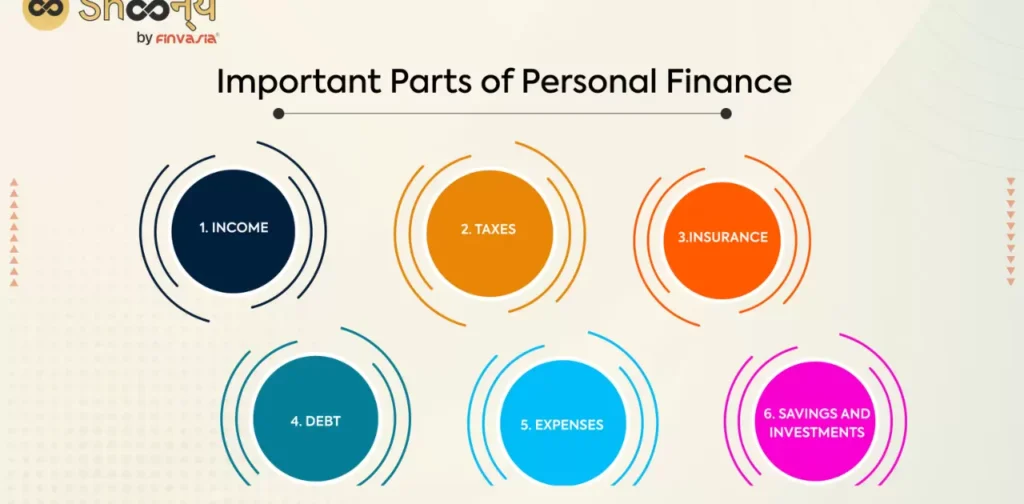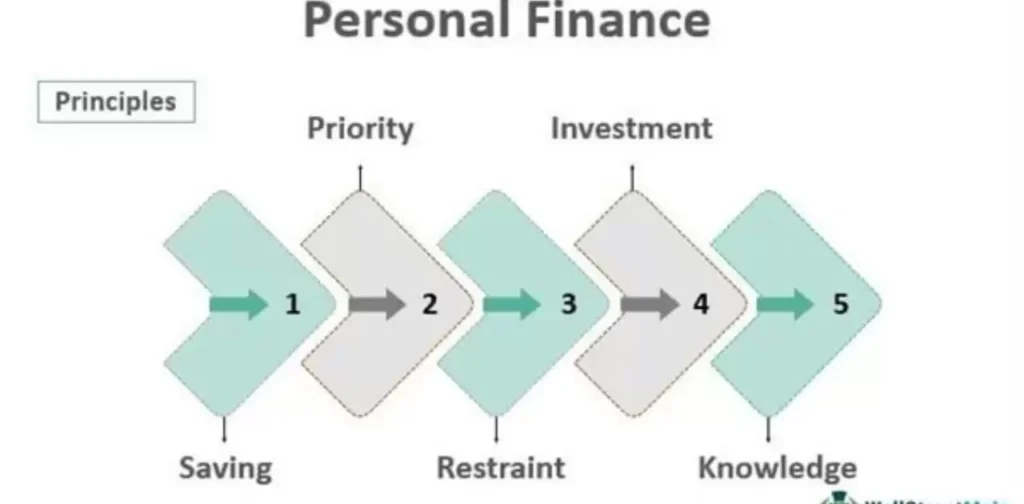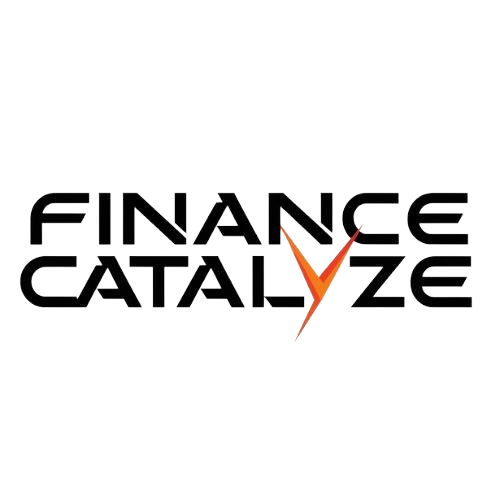Personal finance is deeply intertwined with behavior because how you manage money reflects your habits decisions and attitudes towards finances. Your behavior shapes every aspect of personal finance from how you earn and spend money to how you plan for the future.
Your spending habits greatly impact your financial health. If you consistently overspend or make impulse purchases it can lead to debt and financial instability. Practicing restraint and budgeting can help you live within your means and build savings for the future.
Your attitude towards saving and investing plays a crucial role in personal finance. If you prioritize saving and investing, you can build wealth over time and achieve your financial goals. If you procrastinate or lack discipline in saving and investing, it can hinder your long-term financial security.
What Is Personal Finance?
Personal finance is all about managing your money wisely to meet your financial goals and needs. It involves making decisions about how you earn, spend, save and invest your money.
In simpler terms personal finance is like the roadmap for your money. It guides you on how to make the most of your income. It is budgeting for daily expenses or saving for big purchases.
Personal finance is about taking control of your financial future by making smart choices today. It’s about being mindful of where your money goes and planning ahead to achieve financial security and freedom.
Also read this: Do You Need Full Coverage On A Financed Car?(2024)
The Importance of Personal Finance

Personal finance is essential for achieving financial goals and avoiding debt. It’s like a roadmap for managing your money wisely and securing your financial future. Here are eight short points highlighting its importance:
- Personal finance is crucial for meeting your financial goals, whether it’s saving for retirement or buying a home.
- It helps you avoid debt and financial stress by managing your income and expenses effectively.
- Planning your finances allows you to prepare for unexpected expenses and emergencies.
- Personal finance empowers you to make informed decisions about spending, saving, and investing.
- It lays the foundation for financial security and stability in the future.
- Understanding personal finance helps you navigate complex financial products and services.
- It enables you to build wealth over time through strategic saving and investing.
- Ultimately, personal finance gives you control over your financial destiny and helps you achieve your dreams and aspirations.
Areas of Personal Finance
Areas of personal finance cover everything from how you earn money to how you protect and grow it. These areas include income spending saving investing and protection.
Income encompasses all the money you earn whether from salaries wages or other sources of cash inflow. Spending refers to how you allocate your income on various expenses such as rent, groceries and entertainment.
Saving involves setting aside a portion of your income for future needs or emergencies. Investing is about using your savings to purchase assets like stocks or bonds to potentially earn a return. Protection includes methods like insurance and estate planning to safeguard your wealth and manage risks.
Personal Finance Services
Several financial planning services fall under one or more of the five areas. You’re likely to find many businesses that provide these services to clients to help them plan and manage their finances. These services include:
- Wealth Management
- Loans and Debt
- Budgeting
- Retirement
- Taxes
- Risk Management
- Estate Planning
- Investments
- Insurance
- Credit Cards
- Home and Mortgage
Personal Finance Strategies

Personal finance strategies are essential for effectively managing your money and achieving financial goals. These strategies involve various tactics and practices that help individuals make the most of their income and resources.
Key strategies include creating and sticking to a budget, establishing an emergency fund, and paying off debt systematically. Saving for retirement and investing wisely are also critical components of personal finance strategies.
Strategies like limiting and reducing debt using credit cards wisely and monitoring credit scores play a crucial role in maintaining financial health and stability. By implementing these strategies individuals can work towards financial security and freedom.
Read also this: How Many Jobs Are Available In Finance Consumer Services
Personal Finance Skills
Personal finance skills are essential abilities that enable individuals to effectively manage their money and make informed financial decisions. These skills encompass various aspects of financial management, from budgeting to investing.
Key personal finance skills include budget prioritization assessing costs and benefits and practicing restraint in spending.
By honing these skills, individuals can improve their financial literacy and make better financial choices for themselves and their families, leading to long-term financial stability and success.
Personal Finance Education
Personal finance education is crucial for individuals to understand how to manage their finances effectively. It encompasses learning about budgeting, saving, investing, and protecting one’s financial future.
Through online resources books or courses personal finance education equips individuals with the knowledge and skills needed to make informed financial decisions. By investing in financial education individuals can take control of their finances and work towards achieving their financial goals.
What Classes Can’t Teach
There are certain aspects of personal finance that traditional classes may not adequately address. These include behavioral aspects and emotional responses to financial decisions.
Classes may not teach the importance of discipline in sticking to a budget or the ability to make timely financial decisions. Additionally, they may not cover the emotional detachment necessary for making rational financial choices in the face of uncertainty or pressure.
Breaking Personal Finance Rules

Breaking there rules can sometimes be necessary depending on individual circumstances and financial goals.
While it’s generally advised to save or invest a set portion of your income, there are situations where prioritizing other financial needs, such as paying off high-interest debt or covering essential expenses, may take precedence.
While long term investing is often recommended short term adjustments or diversification strategies may be appropriate based on market conditions or individual risk tolerance.
Frequently Asked Questions
What is the importance of having an emergency fund?
An emergency fund provides financial security by covering unexpected expenses, such as medical bills or car repairs, without resorting to debt.
How much should I save for retirement?
The amount varies based on factors like lifestyle preferences and retirement age, but financial experts often recommend saving at least 10-15% of your income.
How can I improve my credit score?
Paying bills on time, keeping credit card balances low, and regularly checking your credit report for errors are effective ways to boost your credit score.
What is the difference between a traditional IRA and a Roth IRA?
Traditional IRAs offer tax-deferred contributions and tax-deductible contributions, while Roth IRAs provide tax-free withdrawals in retirement and contributions are made with after-tax dollars.
Should I prioritize paying off debt or investing?
It depends on factors like the interest rates on your debt and potential investment returns, but generally, high-interest debt should be paid off first before focusing on investing.
How can I create a budget that works for me?
Start by tracking your expenses, identifying areas for savings, and setting realistic spending limits for different categories. Regularly review and adjust your budget as needed.
What types of insurance do I need?
Essential insurance includes health insurance, auto insurance and renters or homeowners insurance. Depending on your circumstances, you may also need life insurance, disability insurance or long term care insurance.
The Bottom Line
It is a crucial aspect of everyone’s life impacting both short-term financial stability and long-term wealth building.
By understanding and managing it effectively individuals can achieve their financial goals, whether it’s buying a home saving for retirement or funding their children’s education.
Through budgeting saving investing wisely and protecting assets with insurance individuals can navigate the complexities of personal finance and secure their financial future. It is never too late to start improving financial literacy and adopting sound financial habits to ensure a more secure and prosperous tomorrow.

Haarrii, a seasoned finance expert with 4 years of hands-on experience, brings insightful analysis and expert commentary to our platform. With a keen eye for market trends and a passion for empowering readers, Haarrii delivers actionable insights for financial success.







